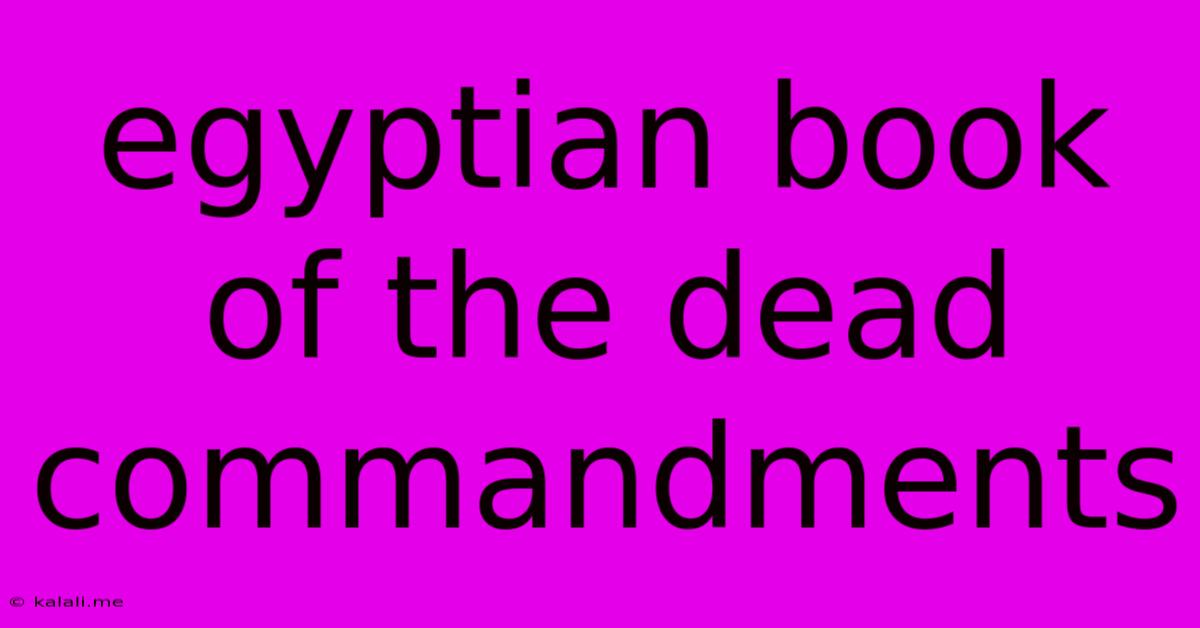Egyptian Book Of The Dead Commandments
Kalali
May 25, 2025 · 3 min read

Table of Contents
The Egyptian Book of the Dead: Commandments for the Afterlife
The Egyptian Book of the Dead isn't a single book, but a collection of funerary texts compiled over centuries. These texts, written on papyrus scrolls and placed in tombs, weren't a literal "book" in the modern sense, but rather a personalized guide to assist the deceased in navigating the perilous journey to the afterlife. While it doesn't contain commandments in the same structured way as, say, the Ten Commandments, it presents a series of spells, prayers, and instructions that, when followed (at least symbolically), could ensure a successful transition and a blissful existence in the Field of Reeds. This article explores the core principles and beliefs that effectively act as "commandments" for achieving this successful passage.
Understanding the Afterlife Journey: The ancient Egyptians believed death wasn't an end but a transition. Their beliefs centered on the preservation of the ka (life force), the ba (personality), and the akh (spiritual essence). Successful navigation of the afterlife required preparation, both in life and death. This preparation involved adherence to specific principles, which we can interpret as the implicit "commandments" within the Book of the Dead.
Implicit "Commandments" from the Book of the Dead:
-
Maintain Ma'at: Perhaps the most crucial "commandment" is upholding Ma'at, the cosmic order and truth. This involved living a righteous life characterized by justice, balance, and harmony. The deceased had to demonstrate their adherence to Ma'at before Osiris, the judge of the underworld, during the Weighing of the Heart ceremony. This weighing compared the deceased's heart to the feather of Ma'at, symbolizing truth and justice. A heart heavier than the feather meant condemnation, while a lighter heart signified passage to the afterlife. This emphasizes the importance of ethical conduct throughout one's life.
-
Know the Spells and Prayers: The Book of the Dead is filled with spells and prayers designed to protect the deceased and aid their passage through various obstacles. Learning and reciting these spells, or having them inscribed on their tomb, was essential. This can be considered a "commandment" of preparation, highlighting the importance of knowledge and ritual for a successful journey. These spells covered various aspects, including avoiding dangerous creatures, navigating the underworld, and gaining access to the afterlife's blessings.
-
Offerings and Remembrance: The living played a vital role in ensuring the deceased's well-being in the afterlife. Regular offerings of food, drink, and other necessities were believed to sustain the deceased. Remembering and honoring the deceased through rituals and ceremonies also held significance. This implicitly "commands" the living to continue their connection with the departed, ensuring their continued existence.
-
Respect the Gods: The Book of the Dead emphasizes the importance of respecting and honoring the various deities of the Egyptian pantheon. Appeasing them through prayers, offerings, and proper ritual was crucial for navigating their domains in the afterlife. This emphasizes a "commandment" of piety and reverence for the divine order.
-
Preserve Your Body: The elaborate mummification process itself reflects a strong belief in the importance of preserving the physical body for the afterlife. The body was considered a vessel for the soul, and its preservation was essential for the successful transition and continued existence. This underscores the importance of physical preparation for the journey.
Conclusion:
The Egyptian Book of the Dead doesn't explicitly list commandments like a modern religious text. Instead, it provides a rich tapestry of spells, prayers, and instructions that implicitly guide the deceased towards a successful afterlife. These "commandments," focused on ethical conduct, ritualistic preparation, and reverence for the divine, reveal the profound beliefs of ancient Egyptians about life, death, and the journey beyond. Understanding these principles offers a glimpse into their complex worldview and the importance they placed on a righteous life and proper preparations for the afterlife.
Latest Posts
Latest Posts
-
How Do I Use Diatomaceous Earth
May 25, 2025
-
Wiring A Outlet From A Switch
May 25, 2025
-
Can You Breed Fish In Minecraft
May 25, 2025
-
What Is A 3 Way Bulb
May 25, 2025
-
Best Place To Sell Engagement Ring
May 25, 2025
Related Post
Thank you for visiting our website which covers about Egyptian Book Of The Dead Commandments . We hope the information provided has been useful to you. Feel free to contact us if you have any questions or need further assistance. See you next time and don't miss to bookmark.